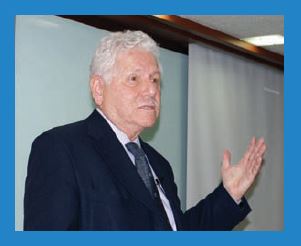
The New global order and implications for development
- Date 2012-05-01 06:26
- CategoryResearch and Education
- Hit1520


As the world is slowly recuperating from the global financial crisis, a new global economic order has evolved. This entails a thorough review of the role of ODAs and aid policies in economic development.
This was the essence of Dr. Danny Leipziger’s lecture on “The New Global Order and Implications for Development Thinking and Aid Policy,” delivered on March 16 at the Lincoln Hall. Currently a professor of International Business and International Affairs at the George Washington University School of Business, Dr. Leipziger has previously served as Vice President of the Poverty Reduction and Economic Management Network (PREM) of the World Bank from 2004-2009.
Dr. Leipziger opened his lecture by describing the changes in the global economic order following the financial crisis besieging the West. Prior to the current predicament, the advanced economies such as the US and the EU were the primary custodians of economic development. As they began to struggle in the wake of the crisis, although a letup is foreseen, there seems to be no immediate remedy to restore their dominance in the world financial market. Dr. Leipziger then highlighted the roles of the new emerging powers—unattested and still inadequate to take up the cudgels on behalf of the struggling economies—whose task is huge and challenging.
He then launched into a discussion of the role of ODAs in development, pointing out the pros and cons of aid provisions. He particularly noted the fact that although ODA has seen progress through the UN Millennium Development Goals (MDGs), it is more difficult to identify a real success, especially in Africa, a region that receives approximately 36% of total global aid (OECD DAC Statistics 2010). “Is ODA a flawed concept, or is it just poorly administered?” Dr. Leipziger invited the audience to ponder, then offered an optimistic reply by singling out the East Asian case, specifically that of Korea, as positive proof that wise government planning and proper administration of ODA can lead to economic growth and poverty reduction.
His lecture concluded with an emphasis on several issues that countries need to confront, i.e., the importance of government planning in the midst of high uncertainty and market stress, the need to globally benchmark infrastructure and governance, and the urgency to tackle major problems like migration, climate change, crime and drugs that affect development prospects.
Several members of the diplomatic corps also attended the lecture, joining a number of KDI School students: Ms. Margaret Clarke-Kwesei, Ambassador of Ghana, Ms. Grecia Fordelicia Richardo Polanco, Ambassador of the Dominican Republic and Mr. Shahidul Islam, Ambassador of Bangladesh graced the event. Dr. Leipziger’s lecture was part of a series of special discourses sponsored by the KDI School for the Spring Term.
By Maria Charmaine D. GUEVARA (2012 MDP, Philippines)
Related News
-
Research and Education1 day ago
Republic of Korea Economic Bulletin, May 2024#KDI #Economic #KDISCHOOL #kdischool #Economic Bulletin #Research
-
Research and Education29 days ago
Republic of Korea Economic Bulletin, April 2024#KDI #Economic #KDISCHOOL #kdischool #Economic Bulletin #Research
-
Research and Education57 days ago
Republic of Korea Economic Bulletin, March 2024#KDI #Economic #KDISCHOOL #kdischool #Economic Bulletin #Research
